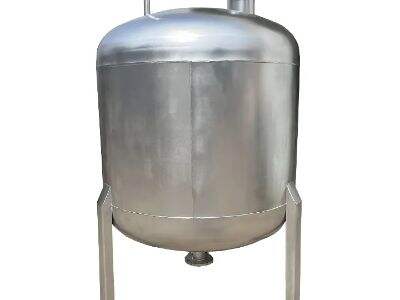Eenmalig versus herbruikbare IBC's: een moeilijke keuze Het kiezen van de juiste IBC kan een moeilijke beslissing zijn. Derksen biedt beide opties aan klanten. Hieronder bespreken we enkele punten die u moet overwegen bij de aankoop van IBC-containers.
Dingen om te onthouden bij het kiezen van IBC-vaten:
Bij het kiezen tussen een eenmalig en herbruikbaar IBC zijn er een paar belangrijke aandachtspunten. Een van de dingen die u moet overwegen, is hoe vaak u het IBC zal gebruiken. Als u het slechts een of twee keer nodig heeft, kan een eenmalig IBC de betere keuze zijn. Als u echter van plan bent het vaak te gebruiken, kan een herbruikbaar IBC op de lange termijn kosten besparen.
Het milieueffect van de IBC is nog een ander aspect om rekening mee te houden. Herbruikbare IBC's zijn ook milieuvriendelijker, omdat ze meerdere keren worden gebruikt, wat minder afval oplevert. Migrerende IBC's daarentegen kunnen niet opnieuw worden gebruikt en worden simpelweg weggegooid na één keer gebruik, wat mogelijk leidt tot vervuiling en afval.
Kosten zijn nog een overweging bij de keuze tussen wegwerpende en herbruikbare IBC's. Hoewel enkelgebruiks-IBC's in eerste instantie goedkoper kunnen zijn, kan dit op de lange termijn wel oplopen omdat je steeds nieuwe exemplaren moet kopen. Hoewel herbruikbare IBC's een hogere initiële kosten met zich meebrengen, kunnen ze uiteindelijk kosten besparen omdat ze meerdere keren gebruikt kunnen worden.
Herbruikbare containers Complicaties kunnen ontstaan bij het schoonmaken en beheren van herbruikbare containers. Maar Derksen heeft enkele tips voor het schoonmaken en in stand houden van herbruikbare IBC's, zodat ze in goede staat blijven en veilig in gebruik zijn. Door regelmatig schoon te maken en het onderhoud te verzorgen, verleng je de levensduur en bespaar je op de lange termijn geld.
Samengevat: De keuze tussen herbruikbare en eenmalige IBC's komt neer op een heleboel factoren. Hoewel een wegwerpartikel goedkoper kan zijn, zijn herbruikbare beter voor het milieu, kostenefficiënter op de lange termijn en kunnen veel ervan worden onderhouden om telkens opnieuw gebruikt te worden. Derksen biedt alle klanten de mogelijkheid om te kiezen wat het beste bij hen past.
Het milieueffect van eenmalige versus herbruikbare IBC's:
Wat het milieueffect betreft van eenmalige versus herbruikbare IBC's, is er geen twijfel mogelijk: herbruikbare zijn beter. Foto: Eenmalige IBC's zijn bedoeld voor eenmalig gebruik en wegwerpen, wat kan leiden tot vervuiling en afval. Herbruikbare IBC's daarentegen kunnen opnieuw gebruikt worden en voorkomen afval en vervuiling.
Bij het kiezen voor herbruikbare IBC's kunt u niet alleen helpen bij het verlagen van uw koolstofvoetafdruk, maar ook een positieve bijdrage leveren aan onze planeet. Derksen erkent het belang van duurzaamheid en wij kunnen herbruikbare IBC-oplossingen bieden voor klanten die milieuvriendelijke keuzes willen maken.
Welk type IBC is goedkoper? :
De meest economische IBC – wat goedkoper is in gebruik? Als u probeert te beslissen welk type IBC herbruikbaar is en wat goedkoper is, kan het nuttig zijn om de langetermijnkosten met elkaar te vergelijken. Hoewel wegwerf-IBC's mogelijk een lagere initiële prijs hebben, kunnen de kosten voor het blijven aankopen van nieuwe containers over tijd aanzwellen. Bij gelijke specificaties is de aanschafprijs van herbruikbare IBC's wellicht hoger, maar het is een waardige investering omdat u ze meerdere keren kunt gebruiken.
Hergebruikbare IBC's bevorderen ook minder aankoopfrequentie en kunnen een lange levensduur hebben wanneer ze goed worden onderhouden. Bij Derksen zijn wij van mening dat u, als ondernemer, zichzelf verplicht bent om geld te besparen en een slimme bedrijfsbeslissing te nemen door een herbruikbare IBC van Derksen aan te schaffen.
Gids voor het schoonmaken en onderhouden van herbruikbare IBC's:
Alleen regelmatig schoonmaken en onderhoud kan ervoor zorgen dat herbruikbare IBC's in een veilige staat blijven. Derksen deelt expertise met AMG-klanten over het schoonmaken van herbruikbare IBC's, om zo de levensduur van hun containers te verlengen.
Het voorbereiden van de IBC's op hergebruik vereist eerst legen en spoelen met water. U wilt niet dat resterende residuen of verontreinigingen blijven zitten en in de toekomst nieuwe verontreinigingen aantrekken. Na het spoelen, desinfecteert u de IBC met een reinigingsoplossing die Derksen heeft aanbevolen, om eventuele bacteriën of kiemen te vernietigen.
Hergebruikbare IBC's moeten ook regelmatig worden geïnspecteerd. Controleer op schade zoals scheuren of lekken en zorg tijdig voor herstel. Door bij het schoonmaken en onderhouden van uw herbruikbare IBC's een paar goede praktijken toe te passen, kunt u ze jarenlang in goede conditie en veilig in gebruik houden.
Voordelen en nadelen van eenmalige en herbruikbare IBC's:
Eenmalige en herbruikbare IBC's hebben allebei hun voordelen en nadelen. Het voordeel van eenmalige IBC's is dat ze vooraf verpakt zijn en direct gebruikt kunnen worden, er is geen reiniging of onderhoud nodig. Maar op de lange termijn kunnen ze echter kostbaar zijn en afval en vervuiling veroorzaken.
Aan de andere kant, meststofopslagtanks herbruikbare IBC's zijn op de lange termijn milieuvriendelijker en kostenefficiënter. Hoewel ze iets meer inspanning vergen bij het schoonmaken en onderhouden, kunnen ze telkens opnieuw gebruikt worden, wat op de lange termijn afval en kosten bespaart. Derksen levert beide varianten om alle klantbehoefte te kunnen bevredigen; zij kunnen kiezen op basis van hun voorkeur tussen gemak en duurzaamheid.

